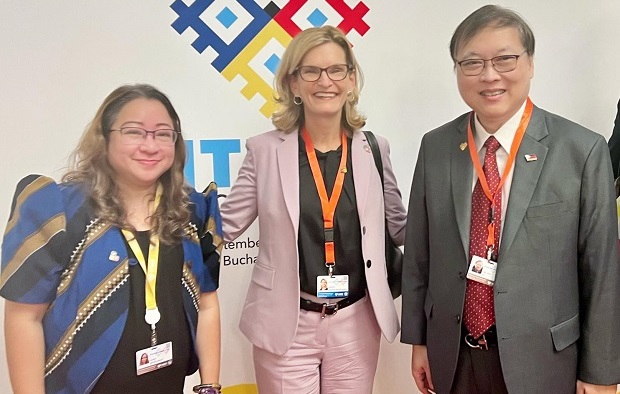The Philippines has officially started its re-election bid for a council seat in the International Telecommunication Union (ITU), the United Nations specialized agency for information and communication technologies (ICT), for the term 2023-2026.

The Department of Information and Communications Technology (DICT) steered the campaign where the Philippine delegates met with the ministers and high representatives of member-states of the ITU in Bucharest, Romania, on Sunday, Sept. 25, for the Bucharest Declaration on “Building a Better Digital Future for All.”
“As the world moves deeper into the 4th industrial revolution, the Philippines continues to strengthen its commitment to embrace digital transformation as a major national strategy at all levels. The Philippines’ participation today is a clear and resounding manifestation of our tenacity to rise above all challenges including the pandemic,” DICT undersecretary Jocelle Batapa-Sigue, who represented the Philippines as deputy minister for the ITU Plenipotentiary Conference 2022, said during her speech.
Batapa-Sigue, at the invitation of the Ministry of Research, Innovation and Digitalization of the Government of Romania in the Ministerial Roundtable, reiterated the commitment of the new administration to accelerate the government’s digitalization and to mobilize competency development projects.
“Under this new administration, we aim to intensify and improve e-governance, and deploy digital skilling programs in partnership with the industry and ITU,” she said.
Bucharest Declaration
At the event, a call to action to affirm and share the 49 countries’ commitment was made by the ITU in the Bucharest Declaration, “to ensure a Free, Open, Global, Interoperable, Reliable, and Secure Internet for all, to enable and foster universal access to affordable, high-quality and secure telecommunications/ ICTs for all (Universal Connectivity), to foster equitable and inclusive use of telecommunications/ICTs to empower people and societies for sustainable development.”
It added that the ITU will “collaborate closely with related global and regional organizations to catalyze efforts towards an inclusive, connected, sustainable and secure digital economy and society, and to raise ambition for our contribution in fighting the climate crisis.”
The Philippines has been an active member-state of the ITU since 1912 and is part of the governing council in 1959, 1982, 1989, 1994, 1998, including the last four consecutive terms since 2007.
This year, the ITU aims to step up and take proactive action in accelerating digital transformation, universal connectivity and inclusion to ensure no one is left behind.
According to Batapa-Sigue, the country remains an ICT powerhouse globally despite the health-related protocols and lockdown of ICT-enabled industries during the height of the pandemic.
“Our business process management sector is now 1.4 million-strong. Our online freelancers are now more than 4 million-strong and our startups have increased in numbers. Our gig economy consisting of young digital Filipino freelancers grew at an unprecedented pace of more than 200 percent during the pandemic,” she said.
Batapa-Sigue also revealed that ICT industries in the Philippines “resiliently shifted to up to 60 percent work-from-home model and 40 percent office based to comply with health protocols but still achieved their business targets.”
“Today we strive to increase our presence in the emerging technologies market and higher value services through upskilling and industry certification programs,” she said.
DICT will continue its deployment of connectivity down to the countryside through the DICT’s Free Wi-Fi For All and National Broadband programs, she assured.
She also highlighted the Digital Cities program where the department also empowered 31 more cities, on top of the six Digital Centers of Excellence and 10 Next Wave Digital Hubs.




